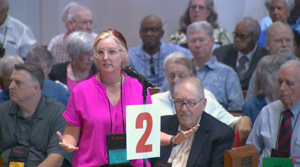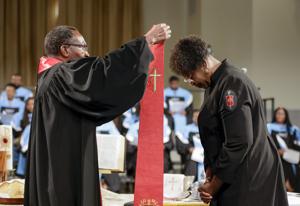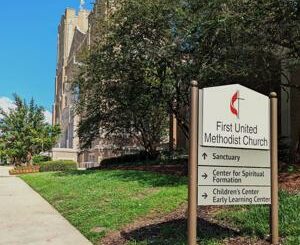
The ripple effects of a “deep conflict” in the United Methodist Church continued to play out Saturday as 95 Louisiana churches officially disaffiliated from the denomination.
Hundreds of delegates in the Louisiana Annual Conference, UMC’s governing body for state churches, packed inside First United Methodist Church Baton Rouge’s downtown sanctuary for a special called session to decide whether to ratify departures for the worship houses. With Saturday’s ratifications, nearly 40% of Louisiana churches once connected to the global denomination have cut ties over the past four years.
“We realize, in this, the loss of some friends, colleagues and communal relationships. The loss of treasured spaces and places where baptisms and weddings, funerals, confirmations, ordinations and commissioning services were held. And where relationships and faith formations happened in Sunday school and Bible studies,” Louisiana Annual Conference Bishop Delores Williamston told delegates moments before the votes were taken.
“In this moment, we are to remember God is our dwelling place,” she later added. “God is with us in this place and God is beyond the structures of denominations, disaffiliations, affiliations and other expressions. God is always with us and will never leave us.”
Each of the churches separated under “Paragraph 2553” — a provision added to the UMC’s Book of Discipline in 2019 as an exit policy for local congregations to leave for “reasons of conscience,” such as the church’s stance on same-sex marriage and LGBTQ clergy.
The United Methodist Church currently forbids LGBTQ clergy and punishes ministers who officiate same-sex marriages. At a global level, the church has reinforced that stance, but there is growing dissatisfaction among American parishioners who want to soften the church’s approach. Anticipating potential changes over the issue, some conservative churches across the country have chosen to leave the denomination.
While questions of sexuality are at the forefront of the departures, church officials say other issues — such as disagreements over how to interpret the Bible, opposition to the church’s policy of frequently moving ministers, and debates over church property — are also at play.
Conference leaders said the disaffiliations approved Saturday officially take effect May 31 for each of the churches that pay the denomination their exit liability fees by then. All but 15 of the 95 churches had already satisfied those financial requirements by Wednesday, according to a disaffiliation report released this week.
Some delegates who spoke out Saturday called for more time to take stock before making a final decision. Ray Branton, a retired clergy member from Shreveport, estimated the Louisiana UMC will lose 40% of its income over the next two years from churches departing and taking all their assets with them. He suggested postponing the vote so the conference could consider making congregations divest some of their assets when they leave the denomination.
“This is a divorce y’all. It really is. And I just want to ask you, what kind of divorce do you want to have?” Branton said. “I don’t want to be the church version of the Hatfields and McCoys going forward. Do you?”
Lamar Oliver, a bishop from Rushton, said 69 churches that walked away from the Louisiana conference prior to Saturday’s mass exodus didn’t have to give up any of their respective assets.
“It’s a matter of fairness. There have been (69) churches that have already completed this process, doing exactly what the Board of Trustees has required of them. Nothing more, nothing less,” he said. “I think it would put our integrity in question to say those (69) churches did one thing, and we’re going to hold a bunch of other churches to a different standard.”
Lori Spangler of Foundry-St. Andrews in Sterlington, among the list of churches disaffiliating Saturday, said parishioners spent months praying, having heartfelt discussions with fellow church members and pondering on whether to disaffiliate. She urged delegates to respect the conscientious decisions made by each church.
“To say no, we don’t want to do this now would be a slap in the face,” Spangler said. “Does it divide us, is it heartbreaking? Yes, absolutely. But one of the things that I have always said is there is work that is hard and it is holy. And sometimes those things go hand in hand.”
Afterward, Williamston sought to offer a hymn of solace. She acknowledged the need for healing throughout the state conference, but noted “signs of hope” abound in Louisiana’s Methodist church body as she called on delegates to “raise the ceiling of our hopes” and march forward in the denomination’s mission of discipleship.
“This road has been long and it has not been easy,” the bishop said. “We are a people of hope, a laity of hope, pastors of hope, churches of hope and shepherds of hope in the United Methodist Church in Louisiana. For our hope is built on nothing less than Jesus’ blood and righteousness. And we dare not trust the sweetest frame, but wholly lean on Jesus’ name. On Christ the solid rock we will stand. All other ground is sinking sand.”



Leave a Reply